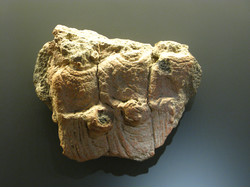Artwork Search
Arts in Southeast Asia Database
Monks holding alms bowls
Keywords : Buddha image, Terra-cotta Sculptures, Buddhist Monks, U-thong City
| Site common name | U-thong National Museum |
|---|---|
| Type of artwork | Sculpture |
| Sub district | U Thong |
| District | U Thong |
| Province | Suphan Buri |
| Region | Central |
| Country | Thailand |
| Geographic Coordinates Decimal degree | Lat : 14.373126 Long : 99.891406 |
| Geographic Coordinates UTM | Zone : 47 P Hemisphere : N E : 596139.84 N : 1589166.81 |
| Place of artwork | In the exhibition hall |
| History of production | The exact age of this sculpture is unknown, but the thick monastic robes with a wave of folds are comparable with those of Buddha Images in Amaravati style. Some scholars are thus convinced that they have some connection and date the sculpture to the 10th Buddhist century when Amaravati art still significantly affected its counterparts. However, the hypothesis that the monastic robes of the sculpture associate with Amaravati art and that the sculpture is dated to the 9th-10th Buddhist century which is older than other Buddhist art objects, including the stupa to which this terra cotta attached, found in U-thong should be carefully considered. As this sculpture depicts Buddhist monks, to compare it with Buddha Images requires careful consideration. The sculpture might not date from the 9th-10th century. |
|---|---|
| Art | This terra-cotta bas-relief used to decorate a stupa, but it is in badly damaged condition. The sculpture illustrates 3 Buddhist monks standing in a row, and each monk is wearing a monastic robe the shawl of which is covering their shoulders and arms and is holding an alms bowl at navel height. |
| Key academic information | The terra-cotta sculpture depicts 3 monks holding alms bowls. The monks are wearing monastic robes the shawl of which is covering their shoulders and arms with a natural wave of folds. The robe’s artistic style is similar to that of Amaravati Art of India which is dated to the 6th-10th Buddhist century. Some scholars hence believe that this sculpture is one of the most ancient Buddhist art objects found in Thailand. |
| Notice | Discovered at Khao Phra in a suburb of U-thong City, U-thong District, Suphanburi Province. |
| Period | Historical Period |
| Art period | Dvaravati |
| Age | 9th-10th Buddhist century |
| Religion | Buddhism |
| Religion and belief | Buddhism |
| Type of License | Attribution-NonCommercial-NoDerivs (CC BY-NC-ND) |
|---|---|
| Rights | Princess Maha Chakri Sirindhorn Anthropology Centre |
| Date of record creation | 2015-08-19 |
| Record creator | Rungroj Thamrungraeng |
| Bibliography | ผาสุข อินทราวุธ, ทวารวดี การศึกษาเชิงวิเคราะห์จากหลักฐานทางโบราณคดี. กรุงเทพฯ : อักษรสมัย, 2542. พิริยะ ไกรฤกษ์, ประวัติศาสตร์ศิลปะในประเทศไทยฉบับคู่มือนักศึกษา. กรุงเทพฯ : อมรินทร์การพิมพ์, 2528. ศักดิ์ชัย สายสิงห์, ศิลปะทวารวดี วัฒนธรรมพุทธศาสนายุคแรกเริ่มในดินแดนไทย. กรุงเทพฯ : เมืองโบราณ, 2547. พนมบุตร จันทรโชติ และคณะ, นำชมพิพิธภัณฑสถานแห่งชาติอู่ทอง และเรื่องราวสุวรรณภูมิ. กรุงเทพฯ : กรมศิลปากร, 2550. |


